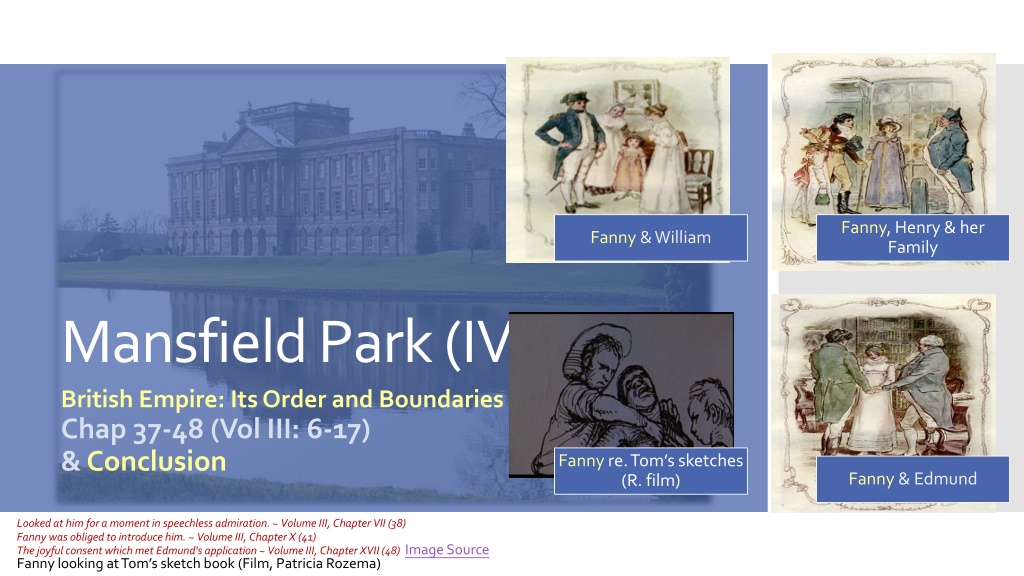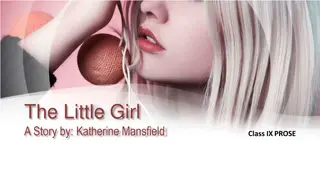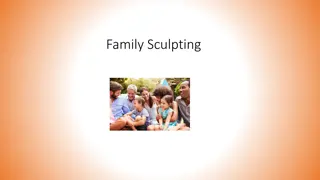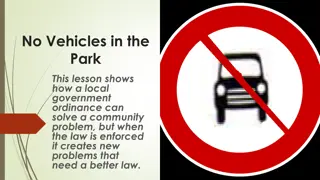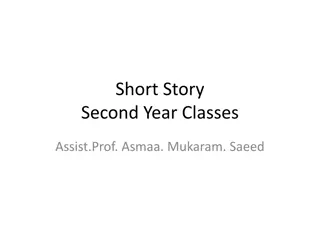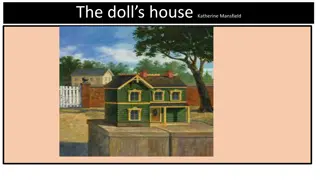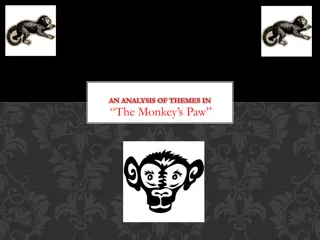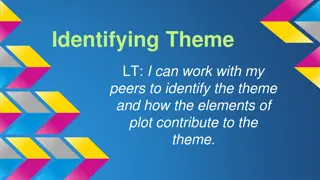Exploring Themes in Mansfield Park: Love, Family, and Society
Explores various themes in Jane Austen's Mansfield Park, focusing on love, family dynamics, social circles, and the concept of empire. Through character interactions and societal boundaries, the novel delves into themes of social propriety, relationships, and personal growth. Workstation discussions and analysis of character motivations contribute to a deeper understanding of the narrative.
Download Presentation

Please find below an Image/Link to download the presentation.
The content on the website is provided AS IS for your information and personal use only. It may not be sold, licensed, or shared on other websites without obtaining consent from the author. Download presentation by click this link. If you encounter any issues during the download, it is possible that the publisher has removed the file from their server.
E N D
Presentation Transcript
Fanny,Henry & her Family Fanny & William Mansfield Park (IV) British Empire: Its Order and Boundaries Chap 37-48 (Vol III: 6-17) & Conclusion Fanny re. Tom s sketches (R. film) Fanny & Edmund Looked at him for a moment in speechless admiration. ~ Volume III, Chapter VII (38) Fanny was obliged to introduce him. ~ Volume III, Chapter X (41) The joyful consent which met Edmund's application ~ Volume III, Chapter XVII (48) Image Source Fanny looking atTom s sketch book (Film, Patricia Rozema)
General Intro & Discussion Questions 1. *Stories of Love and Education Fanny s and Edmund s Love Henry s & Mary s Changes: Why? 2. Family Relations: Fanny at Home 3. *Social Circles: Catastrophes and Solutions 4. Empire: Boundaries of Different Kinds 5. Conclusion: Happy Ending? Outline
Workstation Group Discussion with Kate: this or next week, definitely before mid- term Deadline for Workstation work plan (including job division) & ppt: 4/23 Showtime: topics 4/7 ~5/12 Journal 2 4/28 ~ 5/14(Sat); Journal 3 5/9 (Mon) Housekeeping
Why does Henry change his mind? Where is Fanny s Home? Home, Society & Empire defined in terms of -- Family Relations -- Love Relations -- Boundaries of Social Propriety set after social exchanges & transgression boundaries: geographic (places, ha-ha), class, moral conduct (gratitude & constancy vs. speculation & conquest) Home, Society and Empire
(1) Story of Fanny -- Education and Improvement: How is it a Pygmalion story? -- Fanny s Love (& Edmund s) Social Mobility MP Themes: More than Marriage Plot (2) Story of Families: Family Relations & Influences (3) Social Circles & Games in MP vs. those in London (4) Gains & Failures at the Center and Peripheries of British Empire Empire: Antigua & India MP vs. London Family MP vs. Portsmouth Ref. class & marriage public and private space Fanny vs. Mary Edmund vs. Henry
French Rev. 1789 Romanticism late 18th C 1820 s Regency Period (1811-1820) : Vanity World 1805-1809 1807 1811-13;14 Austen homeless Writing & Publication of MP Abolition of the Slave Trade Act The Wards marriages 1780 s Fanny birth 1780 s Fanny (age 10) to MP 1790 s Oct 1810 -- Sir Thomas and Tom leave for Antigua (Fanny age 16); Sept 1811 Tom returns, April 1812 --Sir Thomas writes home ; late October 1812 SirThomas returns, Dec. 1812 -- The ball at Mansfield Park Jan 1813 Henry s proposals; The Crawfords leave Mansfield; Feb 1813 -- Fanny and William leave Mansfield Park and reaches Portsmouth; M s letter March 1813 -- Fanny had been nearly four weeks from Mansfield. Henry walks into the room. M s letter; Lady Bertram's letter announcing Tom's illness. April 1813 M s two letters; early May Edmund s letter & Fanny s return Summer 1813 -- Edmund turns to Fanny The Crawfords and Rushworth s appearance Mansfield Park: In Historical Contexts
Pride & Prejudice: The work is rather too light, and bright, and sparkling; it wants [i.e. needs] shade; it wants to be stretched out here and there with a long chapter of sense, if it could be had Elizabeth: Witty like Mary Fanny PP (1813) vs. MP (1814) Rejects Collins, a clergyman Rejects Henry Marries Darcy, an estate owner Marries Edmund
1) Sir Thomas goes to Antigua to fix some problems the wealth of MP founded in colonial exploitation 2) He is back, communicative and chatty about the trip. But when Fanny asks about the slave trade, there is a dead silence (chap 21: 136) 3) Lady Bertrams askes William to bring back from India two shawls (chap 31: 208) Colonialism: a) conquest b) breaking of geographical boundaries; expansion/imposition of British culture (values) c) exploitation (of natural and human resources; slavery) d) expansion of the empire and loss of control References made to British Colonialism MP
(1) Stories of Love & Education G3 Edmund s Love: Why does Edmund love Mary? What in Mary that he learns to reject? Is Fanny a good replacement? 2. G1 Mary s Choice: How is Mary s personality revealed in her talk and letters? (see next slide) 3. G2 Fanny s Love: Why does Fanny reject Henry? Does he improve himself when wooing Fanny and how? Is Fanny s waiting for Ed. worthwhile? 4. G9 Henry s Choice: How and why does he change? 5. G6 The Other Characters: How is Susan educated? And Julia improved? Why is Maria irredeemable? (2) Story of Families: Family Relations & Influences 6. G4 Describe Fanny s feelings for her two homes (MP & Portsmouth) values represented 1. Group Discussion Questions: Your Choice 7. G7 What are the problems with Mrs. Norris? Why is she banished from MP to live with Maria at the end? (3) Social Circles & Games in MP vs. those in London 8. G 10 How is London described and how does it change Henry and Mary respectively? (4) Gains & Failures at the Center and Peripheries of British Empire 9. G8 How does Sir Thomas reflect on his own success and failure in educating his children? 10. G 5 Do all the characters put on the margins deserve such treatments by the novel?
1 Leader or Reader 1-2 Summarizer (choose the chapters, too) & Style Analyst (3 examples) 3-4 (7) Commentator & Quotations as evidence 5-6 Connector theme and related examples from the other parts of the novel Group Discussion
Her Witticism: Selfishness must always be forgiven you know, because there s no hope of a cure (7: 49). Every body is taken in at some period or other (5: 34) upholding the true London maxim, that every thing is to be got with money (6: 43) where the natural taste is equal, the player must always be best off, for she is gratified in more ways than one (6: 43) Mary s behavior: at the family theatrical, Sotherton episode, Speculation game, the ball (& necklace), discussion of Henry s wooing & proposal, Tom s illness & Maria s elopement Mary s Letters & Witticism Mary s letters: 1) letters to Fanny (actually for Edmund 38: 255) 2) report on the meeting of Maria & Henry (40: 267) 3) about Henry s visit; people & parties in London; & no news from Edmund (43: 281) ; 4) about Tom s illness (45); 5) about the scandal (46)
Fanny does not miss the Crawfords. William comes to MP, but is out of uniform. Fanny is happy to go to her parents'. 37 Fanny glad to be away from being an apparent receiver of Mary s letters; Portsmouth. Home at last small, noisy TheThrushhas gone out of harbour. Fanny ignored; the children noisy; Betsey has a silver knife. 38 Noise and confusion; Fanny disappointed at her parents. William and Sam go to sea. 39 A letter from Mary about the London society (including Maria). Susan becomes a friend. Another silver knife. Fanny joins a library. 40 Henry comes to visit the Prices, with news about Edmund s going to London They all take a walk to the dock-yard. Henry talks about his work at Norfolk 41 Plot Summary: Chap 37- Crawford joins them and goes to church. He offers to take Fanny to Mansfield in his carriage. Should he go home to take care of business? He knows what he ought to do. 42 source
Marys letter: that Mrs. Rushworth's first party was a success, and to offer her brother's carriage again. A party will keep Henry from Everingham. Fanny more impatient for the result of Ed s proposal 43 Edmund finally writes. He tells of his dissatisfaction. She is the only woman in the world whom he could ever think of. Fanny s soliloquy (287) LB s letters: Tom Bertram is ill. Lack of sympathy at the Prices. 44 Tom is back at Mansfield, and his brother takes care of him. Fanny knows where her home is (293). Mary s letter: asking about Tom's condition; the two sisters indifferent. 45 Mary s letter: about a most scandalous, ill-natured rumour 3 months; Mr. Price reads about it on the newspaper. Edmund s letter, about Julia s elopement, and to say he is coming for the Price sisters. 46 The whole truth is known. Edmund describes his meeting with Miss Crawford; the charm is broken, his eyes are opened. 47 Plot Summary: Chap 37- Let other pens dwell on guilt and misery (but Sir Thomas was longest to suffer.) Everyone gets what they deserve. (next slide) 48 source
Edmunds faulty decision & judgment: of F s living with Mrs. Norris; of joining the play; of F s refusal to marry Henry of sending F back home of proposing to Mary (in person or letter) Edmund s letters (chap 44; 45) 1stabout Mary s changes; about their interconnections, and ways of proposing to Mary (still seeing Mary as the only person he considers as wife)* 2nd letter about Tom, and his wanting to go to London 3rdletter about Julia s elopement Edmund s final revelation (next slide) 1. Edmund s Love & Judgment
She is witty, sociable, athletic, beautiful, but also materialist, calculative and liberal about Tom s illness (45) two poor young men less (294) (Maybe Tom and Edmund) Her interpretation of Henry and Maria s behavior: Calm about it ( no modest loathings ) a folly rather than vice; folly in being detected Fanny s fault; otherwise, theirs would end in regular standing flirtation in yearly meetings (309) suggesting her lack of principles solution: persuade Henry to marry Maria, ask the father to be quiet When Edmund says goodbye to her, she responds in different ways, suggesting the many sides of her personality. A. She turns red; B. playfully sees Edmund s rejection of her as another sermon; C. tries to keep Edmund. (310-11)* 2. Mary s Choice
Diffident self-expressive and principled However, she remains quietly and passively in love with Edmund despite his wrong decisions, his misunderstanding of her, his confidences, and his self-centeredness (303) Her struggles: Turning down Henry s proposals at least 3 times getting away from MP, to avoid seeing Edmund s proposal outbursts after getting Edmund s letter about his indecisiveness (44: 287) Her dilemma in taking the ride of the Crawfords or not. her joy of going home (while watching Edmund suffer) Happy to be useful, beloved and that Ed is no longer duped by Mary MP: dear and perfect (a disciplined subject; Portsmouth: later) 3. Fanny s Love & Growth
His reasons: not only her appearance but also her virtues. His changes at Portsmouth ( chap 41-42) all attentive to her, avoids embarrassing Fanny by not joining their dinner talks about MP positively improved: more considerate* Open to the charms of nature; Discusses his work at Norfolk, asks for Fanny s advice the only friend from MP, he offers to pick F up His problems: changefulness love of conquest (chap 48: 317) 4. Henry s Love for Fanny: His Changes Fanny might have married him (Susan would then live with them)
Susan another Fanny, ill-mannered first and then receives education from Fanny; takes Fanny s place at MP Julia ill educated, but can be improved because she is humble and repentant because Mr. Yates is acceptable (willing to be guided; domestic and quiet, not as much debts as expected Mr. Yates: He was not very solid; but there was a hope of his becoming less trifling of his being at least tolerably domestic and quiet; and, at any rate, there was comfort in finding his estate rather more, and his debts much less, than he had feared, and in being consulted and treated as the friend best worth attending to. 5. The Other Characters Education
Chap 38 -39: Fanny ignored and disappointed Thrush is their only subject -- MP by comparison* Her mother compared to LB and Mrs. Norris (265) incessant noise* not accepted by local community either. * When Henry comes: Fanny feels shame (273) When MP is in trouble, Fanny wants to go home more, and starts to talk about MP as home (45: 293) Fanny s view of the family disorder (46: 298) The Prices, on the other hand, are indifferent to MP s ordeals. 6. Fanny in Portsmouth (chap 38-46)
1. Mrs. Norris: altered creature, quieted, stupified, indifferent to every thing that passed (47: 304) ; sees Fanny as demon of the piece (304) 2. After all, she takes responsibility for Maria 3. LB: sees Maria as a disgrace never to be wiped off ; Sir Thomas: Maria s character can never be restored 7. Outsiders (1): Mrs. Norris & Maria
All husband-chasers and pursuers of money They compete with or are jealous about one another. 8. Outsiders (2) The Frasers, The Stornaway, The Owens
Sir Thomas: 1) Blames himself for being too severe (while Mrs. Norris is indulgent and flattering) 2) Not teaching them principle or modesty (self-denial and humanity 314); not understanding them. 3) Rejecting Mrs. Norris as an hourly evil ; rejects Maria, too. 4) still happy with his own achievements* 9. MP: Order Resumed under Sir Thomas
The family at Portsmouth? The Grants? The people in Antigua? 10. The Other Outsiders
Mansfield Park Conclusion
Improvement of the Estate and its residents all but Lady Bertram Edmund getting over Mary, finds in Fanny s warm and sisterly regard for him a good foundation for marriage. The two returns to MP (319) Sir Thomas 1) reflects on his parenting failure; 2) happy to have Fanny as his daughter, and William and Susan as his prot g s, while firm in rejecting Maria. Julia comes home and Mr. Yates improved (313) Tom -- recovered and became a dutiful and better-behaved son. Happy Ending? Yes. Let other pens dwell on guilt and misery. I quit such odious subjects as soon as I can, impatient to restore every body, not greatly in fault themselves, to tolerable comfort, and to have done with all the rest.
Mr. Rushworth-- gets a speedy divorce from Maria; waits to marry a young woman. marriage as possession & exchange continued elsewhere The Frasers superficial party-goers, competitive on marriage market Happy Ending? No. The Grants-- moved away from Mansfield Park a stall in Westminster & residence in London Mrs. Norris subdued and goes to join Maria, the two s temperament mutual punishment for each other Maria with high spirit and strong passions for Henry, does not get to marry Henry, as the two grow to hate each other. Henry--ends up in wretchedness and self-reproach. (His desire for conquest described) Mary -- continues to live with Mrs. Grant. It takes her a long time to find a good match (definitely not a younger son; 318) * Let other pens dwell on guilt and misery. I quit such odious subjects as soon as I can, impatient to restore every body, not greatly in fault themselves, to tolerable comfort, and to have done with all the rest.
Tom Mr. Yates Sir Thomas Edmund Julia Bertrams Lady Bertram (Maria) Fanny William Susan Ending in Mansfield Park: Order re-constructed
Tom Maria Sir Thomas Lady Bertram Edmund Julia Bertrams Fanny William Susan (Maria) John Francis Norris (oldest.) Fanny Price Henry Admiral & wife Richard Wards + mistress Charles Mary Sam Mrs. Grant Half-sister The Frasers The Prices Betsy Ending in Mansfield Park: Insiders vs. Outsiders
PLAN OF an ESTATE AT MILLBANK WESTMINSTER belonging to THE MARQUIS OF SALISBURY (source) British Library Online Gallery
Book: Jane Austen: The World of Her Novels. Deirdre Le Faye. Frances Lincoln, 2002. (See Google drive) Marriage: courtship and marriage Courting and Marriage in the Regency Estate: What is a Country House? Images: Filming Locations of the Houses & Other Settings Social Background References
